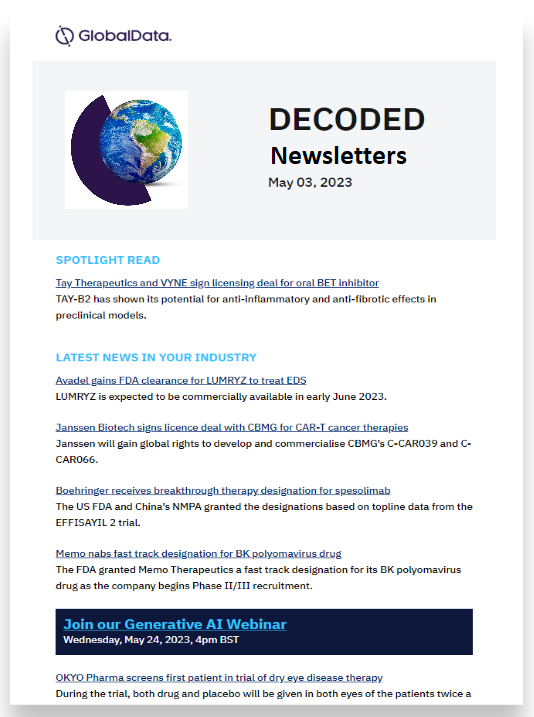
Pharma DECODED
Previous edition: 09 May 2024
Share article
Get the full version straight to your inbox.
Exclusive access to our best-in-class data & intelligence
Subscribe now
15th Annual Outsourcing in Clinical Trials East Coast 2024
The upcoming Outsourcing in Clinical Trials Europe 2024 conference will explore advancements in the clinical trial industry.

Technology has propelled advancements in the clinical trial landscape, with investigators utilising artificial intelligence (AI) and machine learning (ML) in trial development, drug discovery, drug development and data processing.
The increased use of technology is one of several topics on the agenda at Arena International’s Outsourcing in Clinical Trials (OCT) Europe 2024 which will be taking place at the Hyatt Regency Hotel Barcelona Tower on 7-8 May.
The conference will open with a keynote session about how real-world data (RWD) and AI is being used to improve clinical research. Mats Sundgren, PhD, European Institute of Innovation through Health Data (i-HD), will discuss how technology has advanced trial design, the impact of AI in clinical trials and how technology can help anticipate future trends and development.
The conference will then be split into three streams which will discuss a number of topics across clinical operations and outsourcing, clinical technology and innovation, and patient centricity. This includes talks on the utilisation of local care options in trials, use of technology to accelerate early drug discovery and EU trial regulation.
The second day of the conference includes sessions about EU regulations, generative AI in drug discovery, multi-country trials and rare diseases. The conference will close with a number of think tank conversations about GCP compliance, suppliers and local care models.
Executive director of the Good Clinical Practice Alliance (GCPA) Europe, Francis Crawley, will lead a session on the governance of clinical research with European health data.
In the run up to the conference, Crawley spoke to the Clinical Trials Arena team about the current state of the clinical trial landscape in Europe.
Abigail Beaney: What are the biggest talking points at the moment in Europe in regard to clinical research?
Francis Crawley: For me, the biggest concerns are improving efficiency in science and understanding patient impact. Clinical trials are a huge investment, so the more efficient we can be in the design and execution of trials, the better we can address the needs of patients while also getting a return on investment. We need to shorten the timeline for producing medicines and this can be done by having better targets and more efficient methodologies for achieving desired outcomes.
AB: How are European clinical trials adopting the precision medicine approach?
FC: With the development of genomics and omics, we will see more directed and reliable biomarkers. We will also see better targeted molecules for addressing those biomarkers while achieving the desired safety and efficacy results. We are also seeing an enormous surge in data from patient registries, hospital data and real-world data. This will bring about possibilities to improve personalised medicine and biomarker development. On top of that, we have the growing possibilities that AI provides to sift through huge quantities of data to evaluate these easily and quickly.
AB: In December last year, Casgevy was approved by the MHRA, FDA, and the EMA. What are your thoughts, in regards to ethics, with running trials of these kinds of gene therapies using a placebo control?
FC: It's a difficult question. We have a traditional approach to our research methodology, and that is the randomised control trial. People are more comfortable with this trial design if there is a placebo arm because they believe it can give greater clarity regarding the results. Sometimes it does but perhaps not always. Randomised control trial methodology is very strong and it's very difficult to imagine another gold standard. However, I do think that we will start to see more variation with less insistence on particular designs. I hope we move to using more exploratory trial designs. New digital tools can provide more possibilities for running different trial designs.
AB: What considerations should be made for rare disease patients in clinical trials?
FC: How you address the disease and clinical research should be guided by the patients need. There are two problems with rare diseases one is a lack of critical mass - you don't have enough patients and when you don't have enough patients, you don't have enough data. The second issue is that you don't have enough consumers to offset the price of the research. These two factors make it more challenging for the patient communities that are involved with rare diseases.
There are also patients with neglected diseases, in particular tropical medicine situations. Even though these are not rare diseases, they are neglected because there's no market. Going forward, the more efficient we can become with research in collecting and understanding that data, the better opportunity we will have to address these rare diseases and neglected diseases.
AB: What would you say are the biggest strengths in Europe in regard to leading clinical research?
FC: The European system works well for Europe. The clinical trial directive and the regulation on clinical research in Europe have been two very strong milestones, along with the paediatric regulation. I think that Europe has done a very good job in organising its regulatory structure and ethics committees and the collaboration of these.
However, I do think that Europe needs to do more to strengthen its academic research, particularly in preclinical research. There needs to be more investment coming both from Brussels and the member states in preclinical development. That is where I think the academics can and do make a real contribution.
One of the other areas that we need to strengthen is the relationship between academic research and industry research. The Innovative Medicines Initiative (IMI) and the Innovative Health Initiative (IHI) programmes are great for collaboration between the industry and academic. Although we have this very good initiative, I think more fundamental investment is needed.
Latest news

ESCMID 2024: Emerging bacterial infections in neonates and children
Coinfections can complicate disease management and hence continued surveillance and targeted intervention strategies are needed.

FDA fast track status granted to iECURE neonatal OTC deficiency treatment
ECUR-506 is being evaluated in the first-in-human Phase I/II OTC-HOPE study.

Sobi's Aspaveli obtains indication extension approval in Europe
The approval for Aspaveli's extended indication is based on data from the APL2-308 (PRINCE) study.

Biotechs must prioritise ethics to deter GenAI “bad actors”
At the London Biotechnology Show, Microsoft’s senior director of life sciences discussed the ethical use of GenAI.

Zenas raises $200m to advance autoimmune antibody therapy
Zenas signed a licensing deal for Asia-Pacific territories for the bispecific antibody therapy, obexelimab, with Bristol Myers Squibb in September 2023.

Regenex Bio eyes FDA meeting to confirm pivotal DMD trial
Regenex Bio will sit down with the FDA in Q3 2024 to finalise the Phase III trial design.

Acepodia reports preliminary results from ACE1831 Phase I trial
The preliminary data indicates potential benefits for non-Hodgkin's lymphoma patients.

Teva and Medincell report positive data for TEV-‘749 in schizophrenia trial
TEV-‘749 has met primary endpoint in Phase III trial, showing significant symptom reduction in schizophrenia patients.
In our previous edition

Pharma Decoded
AstraZeneca to withdraw Covid-19 vaccine globally
08 May 2024

Pharma Decoded
BioNTech reports net loss of €315.1m in Q1 2024
07 May 2024

Pharma Decoded
Amgen reports a 22% increase in Q1 2024 net revenues
06 May 2024
Newsletters in other sectors
Aerospace, Defence & Security
Medical Devices
Travel and Tourism
Search companies, themes, reports, as well as actionable data & insights spanning 22 global industries
Access more premium companies when you subscribe to Explorer



